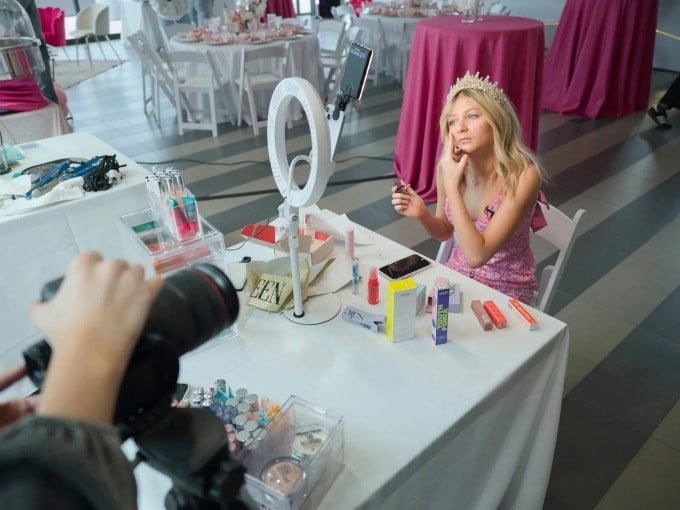Not Gen Y or Gen Z, Gen Apha (born 2010-2024) are the ones creating content that attracts tens of millions of views.

Evelyn Unruh, 13, is a rising internet star with over 490,000 followers and over 9.2 million likes on TikTok.
An 8th grade girl in Kansas City, USA, became famous in 2023 with the "Get ready with me" (GRWM) video genre, a trend of sharing the preparation process for an event or activity.
In the video, Evelyn uses popular beauty products like Summer Fridays lip balm, Glow Recipe toner, and Drunk Elephant's Protini Polypeptide Cream.
She also shares her feelings about school, friendships, favorite things, and many other topics.
After the success of the video series, Evelyn expanded to include "Things That Annoy Me" and "Things That I Don't Understand." Each video garnered millions of views on social media.
Evelyn is a representative of the Gen Alpha generation of content creators, building her image through close and authentic trends such as "Outfit of the day" (OOTD - outfit to wear during the day) or Haul (showing off shopping achievements).
Mischa Joslin, CEO of London-based influencer marketing agency Summer, says Gen Alpha is a generation that grew up with technology and social media. They are familiar with creating natural, spontaneous content that connects with their audience.
“Gen Alpha shares topics and experiences from school, life, friends or personal interests that make their content appealing to their peers,” says Mischa.

But being famous at such a young age comes with its own challenges. Many parents and experts are concerned about the safety of young influencers. For example, Evelyn faces the risk of exposure to negative comments, online harassment and inappropriate content.
Many countries have developed rules to protect young children from the negative effects of social media. Data from Morning Consult shows that 65% of 8- to 10-year-olds spend four hours a day on social media. Or according to the reportBorn Connected: The Rise of the AI GenerationAccording to Qustodio, 4-18 year olds spend an average of 112 minutes per day on TikTok.
In late November, Australia became the first country to pass a bill banning children under 6 years old from using social media, expected to take effect by the end of 2025.
In 2023, the Chinese government issued an order limiting children aged 8-15 to use social media for a maximum of 60 minutes, and children under 8 to only 40 minutes per day. People under 18 are not allowed to access mobile internet (4G, 5G) from 10pm to 6am. This regulation has a strong impact on large technology corporations such as ByteData - owner of Douyin (the Chinese version of TikTok) and Tencent.
Despite mixed reviews, brands are still collaborating with child influencers to reach young customers. Recently, accessories store Claire's collaborated with Gen Z and Gen Alpha stars aged 7-15.
This is not surprising because Gen Alpha is about to become the largest generation of internet users, surpassing both Gen Z and Gen Y. In terms of spending power alone, the total economic forecast of this group will reach 5.46 trillion USD by 2029, nearly equal to the total purchasing power of Gen Z and Gen Y.
However, CEO Mischa Joslin warns that pressuring young people to consume can lead to serious problems. Since children cannot differentiate between advertising and pure content, child influencers promoting products can make other children feel inferior, especially when they do not own the same items as their peers.
“Brands want to profit and Gen Alpha is a huge market. But what needs to be done is to establish safeguards and ethical standards for young children,” she said.
TH (according to VnExpress)